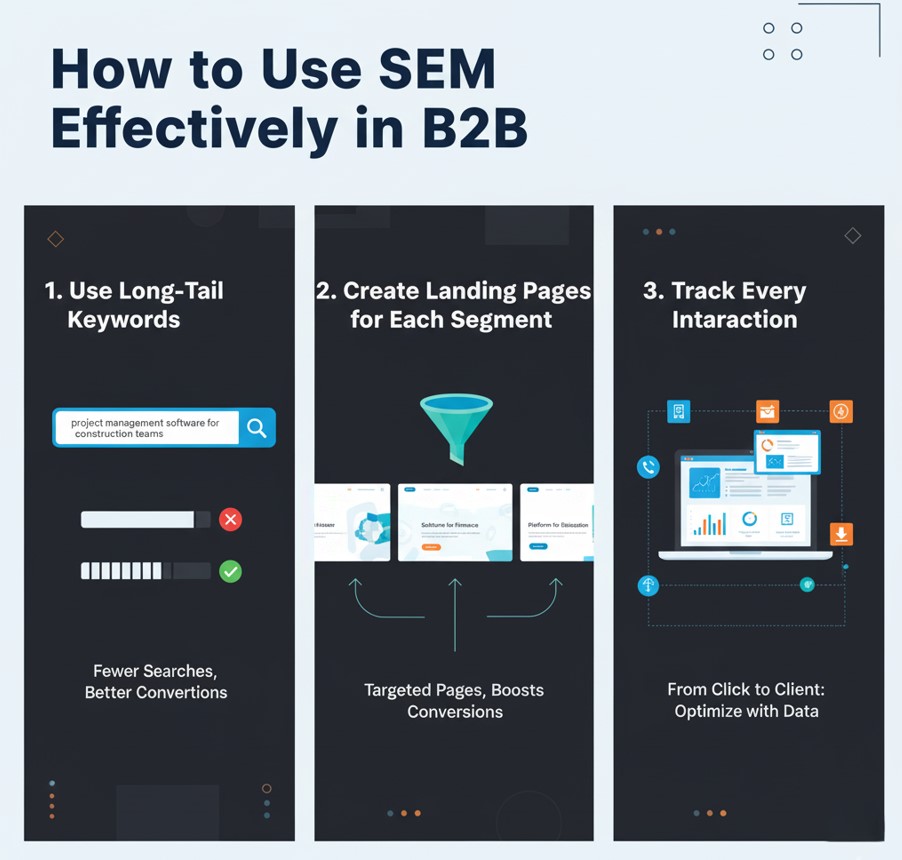
In the digital space, Search Engine Marketing (SEM) has become a reliable source of leads and growth. While it’s widely used in B2C marketing, the real question is: Is SEM effective for B2B companies? The short answer—yes, but only when done strategically.
Let’s break down how SEM works for B2B and what makes it successful.
What Makes B2B SEM Different?
In B2B marketing, you’re not selling to an average consumer. You’re dealing with decision-makers—people who take longer to evaluate, compare, and finalize a purchase. This means:
- The sales cycle is longer.
- The audience is smaller but more focused.
- The value of each lead is often higher.
Because of this, the SEM approach must be laser-focused, with tailored messaging and intent-driven targeting. For B2B companies looking to get the most from SEM, learning how to create and run high-ranking Google Ads campaigns is a crucial next step.
Why SEM Works for B2B Companies
Targeting High-Intent Buyers
In B2B, your ideal customers are not browsing casually. They search with specific intent—like “best CRM software for small business” or “cloud hosting for enterprise.” These searches reflect a clear interest in solutions.
SEM allows you to capture these leads right when they’re looking to make a decision.
Visibility at the Right Moment
B2B buyers do research online before making contact. By running well-crafted Google Ads, you ensure your brand appears during these early stages.
That visibility translates into authority. Even if they don’t click today, they remember you when they’re ready.
Controlled Budget with Trackable ROI
B2B SEM campaigns offer full control over budget, targeting, and timing. You can start small, test ad groups, and refine based on what brings the best return.
You don’t waste money on broad, irrelevant clicks. You pay for high-quality traffic that converts over time.
Common SEM Misconceptions in B2B
“SEM Is Only for B2C”
Many believe paid search only works for consumer products. But in reality, B2B buyers are just as active on Google. They’re searching for partners, tools, consultants, and services every day.
Ignoring SEM means missing out on these critical early-stage touchpoints.
“Our Audience Isn’t Searching Online”
Even niche industries have online behavior. In fact, in highly specialized markets, SEM can help you dominate because of lower competition.
Even if your audience is small, they’re online—and they’re searching.
“It’s Too Expensive”
Yes, B2B keywords can be more expensive. But consider the payoff. One conversion could mean a deal worth thousands—or even millions. SEM isn’t about cost per click. It’s about cost per customer and lifetime value.
How to Use SEM Effectively in B2B

Use Long-Tail Keywords
Broad keywords like “software” don’t work. But “project management software for construction teams” hits a real target.
These long-tail terms may have fewer searches, but they usually convert better.
Create Landing Pages for Each Segment
Don’t drive all traffic to your homepage. Instead, design specific landing pages for each offer or audience group.
A clear, focused landing page boosts conversions. It removes distractions and speaks directly to what the visitor wants.
Track Every Interaction
Set up conversion tracking for phone calls, form submissions, downloads—anything that shows interest.
Use tools like Google Analytics or CRM integrations to follow the journey from click to client. This helps you optimize with real data.
Real Examples of SEM Success in B2B
Consider SaaS companies. Many of them run tightly managed SEM campaigns targeting keywords like “ERP software for retail” or “HR platform for startups.” These campaigns:
-
Bring in demo requests
-
Increase trial sign-ups
-
Build email lists of interested leads
Also, B2B service providers—like IT consultants, logistics firms, or industrial suppliers—use SEM to reach procurement managers and executives actively looking for solutions.
SEM puts them in front of the right eyes at the right time.
Challenges in B2B SEM (and How to Overcome Them)
Longer Sales Cycles
Unlike B2C, B2B conversions can take weeks or months. Don’t expect instant results. Focus on capturing leads and nurturing them over time.
Use remarketing ads to stay visible while the buyer decides.
Limited Search Volume
B2B terms often have lower search volume, but that’s not bad. Low volume doesn’t mean low value. It means you need precision, not scale.
Refine your ad copy and targeting to match that precision.
Ad Fatigue and Click Waste
Generic ads often underperform. Use specific language that speaks to pain points. Make your ads helpful, not salesy.
Also, exclude irrelevant audiences and keywords that drain the budget.
Is SEM Effective for B2B Companies? Final Thoughts
Yes—SEM is highly effective for B2B companies, but it needs a strategy. You’re not chasing clicks. You’re investing in visibility, leads, and long-term partnerships.
The key lies in understanding your audience, tailoring your message, and refining your approach based on data.
Done right, SEM doesn’t just generate leads—it builds authority and moves buyers through your funnel faster.
So if you’re still asking, “Is SEM effective for B2B companies?”—start testing it. The market is already searching for what you offer. It’s time you show up when they do.
Learn more about: How to Optimize SEM Landing Page?



Leave a Reply